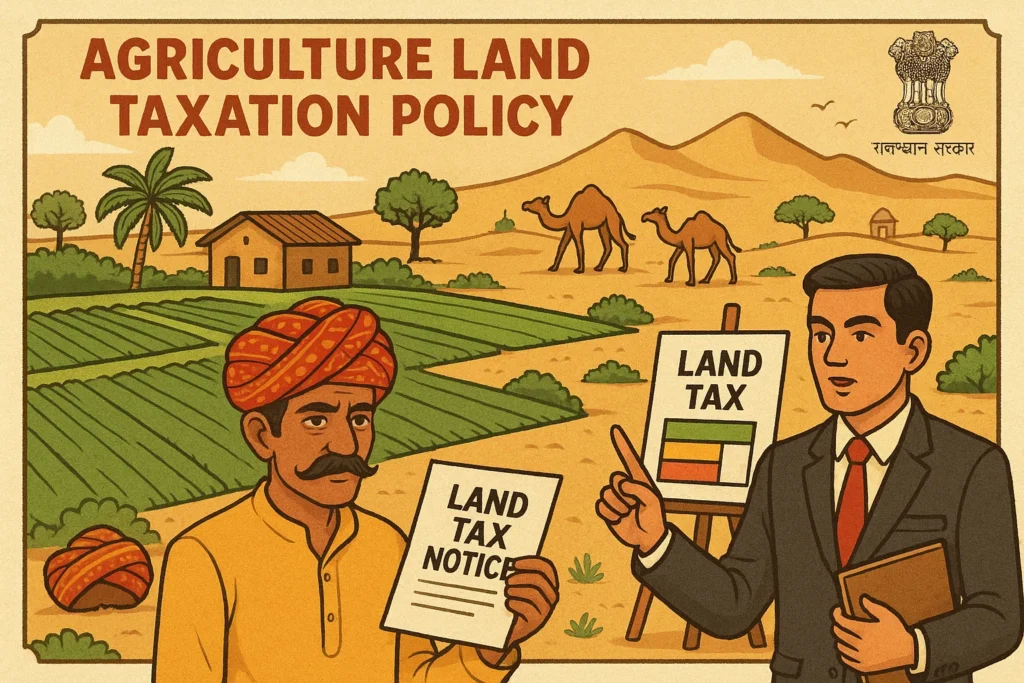Introduction
Rajasthan, the largest state in India by area, is known for its vast stretches of agricultural land and vibrant rural economy. With agriculture being the primary livelihood for a significant portion of the population, understanding the agriculture land taxation policy in Rajasthan is crucial for farmers, landowners, and investors. Whether you are cultivating crops or investing in rural farmland, compliance with state land tax norms can save you from penalties and legal hassles.
This blog offers an in-depth look at Rajasthan’s agriculture land taxation system, covering key elements like tax slabs, exemptions, conversion charges, and important updates.

What is Agricultural Land Taxation?
Agricultural land taxation refers to the levy imposed by the government on land used for farming or agricultural purposes. In Rajasthan, the taxation policy is guided by state-specific rules under the Rajasthan Land Revenue Act, along with notifications issued by the Revenue Department of Rajasthan and other local authorities.
Key Components of Agricultural Land Taxation in Rajasthan
1. Land Revenue Tax
The land revenue or “Bhoomi Rajस्व” is a nominal tax collected by the Rajasthan government from owners of agricultural land. It is assessed based on the:
- Area of land (in hectares or bighas)
- Type of land (irrigated or non-irrigated)
- Location (village, tehsil, or district zone)
In many areas, the amount is as low as Rs. 5 to Rs. 50 per bigha per year, depending on usage and productivity. Landowners must pay this tax annually at the local tehsil office or online via the Apna Khata Rajasthan portal.
2. Conversion Charges for Non-Agricultural Use
If agricultural land is converted into non-agricultural use like residential, industrial, or commercial purposes, it attracts conversion charges and higher taxation. The Urban Improvement Trust (UIT) or Rajasthan State Industrial Development and Investment Corporation (RIICO) may levy additional fees.
Conversion tax slabs:
- Residential: Rs. 50 to Rs. 250 per sq. meter
- Industrial: Rs. 100 to Rs. 400 per sq. meter
- Commercial: Rs. 200 to Rs. 1000 per sq. meter
Note: Rates vary by location (urban, peri-urban, or rural).
Tax Exemptions and Benefits
1. Farmer Tax Exemptions
Rajasthan’s tax policy provides significant relief for small and marginal farmers. Agricultural land held by individuals solely for cultivation purposes is largely exempt from income tax and has nominal land revenue charges.
2. No Capital Gains Tax on Inherited Agricultural Land
If the land is inherited and used for farming, capital gains tax may be waived under Section 10(1) of the Income Tax Act, provided it falls within rural zones.
3. Stamp Duty Concessions
The state offers lower stamp duty on agricultural land transactions compared to urban land deals. Women buyers receive 2% additional rebate on stamp duty under the Rajasthan Stamps Act.
Digital Records and Online Tax Payment
To improve transparency and ease of access, the Rajasthan government has digitized land records and revenue collection via:
- Apna Khata Rajasthan (apnakhata.raj.nic.in)
- E-Mitra Portal
- Rajkisan Portal
These platforms allow landowners to:
- View Jamabandi (land records)
- Pay land revenue online
- Apply for land conversion
- Check mutation status
Agricultural Income Tax: Is It Applicable?
As per Indian tax laws, agricultural income is exempt from central income tax under Section 10(1). However, states can impose taxes at their discretion. Rajasthan currently does not levy income tax on agricultural income, but landowners must ensure the income qualifies as genuine agricultural income.
If agricultural land is sold within 2 years of purchase, short-term capital gains tax may apply under Section 45 of the Income Tax Act.
Penalties for Non-Compliance
Failure to comply with land tax norms can lead to:
- Fines
- Cancellation of land conversion approvals
- Legal disputes in revenue courts
- Delay in transfer of ownership
To avoid such issues, always:
- Update mutation records after purchase
- Pay annual land tax on time
- Verify usage before converting land
Recent Updates in Rajasthan’s Land Taxation
1. 2023-2024 Budget Announcement
The Rajasthan state government announced digitization of 100% land records and simplification of agriculture to residential land conversion process. New conversion norms now allow:
- Faster online approvals
- Unified conversion rates in Gram Panchayat areas
- E-stamping facility through E-Mitra
2. Introduction of Land Bank Policy
To attract investment, the Rajasthan government introduced a Land Bank Policy, enabling private investors to lease agricultural land for renewable energy, warehousing, and agro-processing with tax benefits.
Investment Perspective: Why It Matters
Rajasthan is witnessing growing interest from urban investors in agricultural and farm land investments due to:
- Low entry costs
- Availability of large land parcels
- Proximity to Delhi-NCR, Jaipur, and Gujarat
- Rising trend of weekend farmhouses and organic farming
Understanding land taxation helps investors plan their exit strategies, calculate capital gains, and identify tax-saving opportunities during resale or land pooling.
Important Documents for Land Taxation
To ensure smooth compliance with agricultural land taxation, keep these documents handy:
- Jamabandi/Record of Rights
- Khasra Map
- Mutation Deed
- Conversion Sanction Letter (if applicable)
- Revenue Payment Receipt
- Agricultural Income Certificate (if claiming tax exemption)
Agricultural land taxation in Rajasthan is a crucial aspect of rural development and real estate planning. Whether you’re a farmer, landowner, or investor, staying updated with land revenue policies, exemptions, and digital services can help you remain compliant while maximizing returns.
As the state embraces digitization and policy reforms, taxation is becoming more structured and transparent. Always consult local revenue officers or tax consultants when buying, converting, or selling agricultural land in Rajasthan to avoid legal or financial complications.




